I wrote about all the reasons I fell in love with the Enneagram here—one reason was the complexity of the Enneagram. The Enneagram is by far the most beautifully intricate personality type I've seen.
The Enneagram is organized in sets of three: it distills humanity to three essential archetypes (Centers of Intelligence), with two variations for each, which makes nine basic archetypes (the Enneagram numbers itself). These nine archetypes can be further subdivided into 27 variations (the Instinctual Variants) and so on and so forth through Wings, Stress and Growth Numbers, Levels of Development—literally creating thousands of variations
If you know your number and would love to learn more of the complexity of the Enneagram and how it contributes to the nuances of humanity in general and to you in specific—you've come to the right place.
If you don't know your number, pop over to the Enneagram Institute or pick up one of the many wonderful books on the Enneagram. (Otherwise, this entire article will read like Greek.) Once you've fallen in love with the Enneagram (and experienced the classic Enneagram-cringiness that goes with discovering your number in all its blatant darkness as well as light), come on back and enjoy learning how much more the Enneagram's variations can help provide a blueprint for your personal psychological transformation.
1. You have wings!
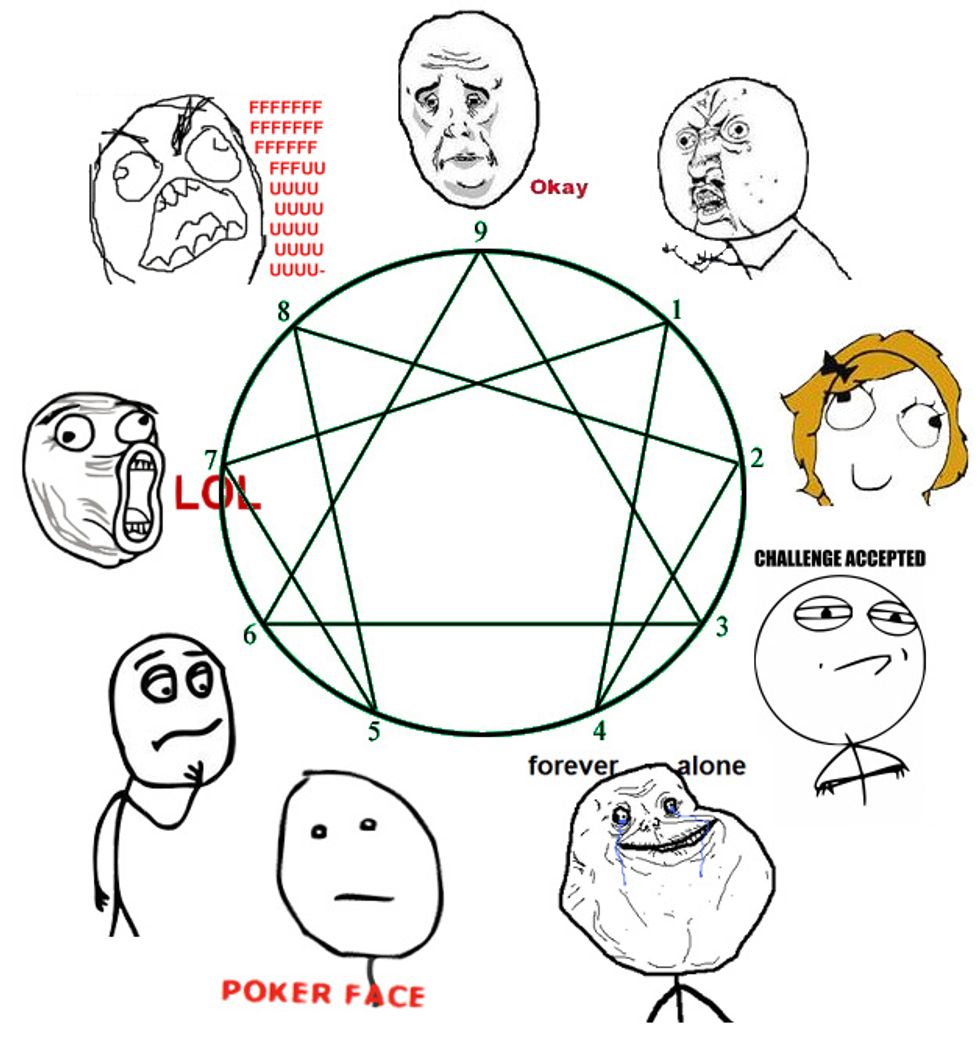
You know now (presuming you have a rough guesstimate of your number!) there are 9 numbers on the Enneagram, distilling all of humanity's vast and diverse fears and motivations and desires into 9 essential categories. But each number is heavily influenced by its next door neighbors: the numbers on either side of that number. This is a "wing".
So 2s, for example, are inbetween 1 and 3, and a 2 person will therefore have a 1 wing (2w1) or a 3 wing (2w3). This means the 2's primary motivations are those of the 2 number, but they are heavily influenced by their wing number and will have many of that number's motivations, fears, and strengths as well. A person can also be influenced by both of their wings (though they will always have one that's dominant) or influenced little by either. A 2w1 will behave very differently than a 2w3, being more driven to what's "right" rather than how they appear to others. Even though they're both 2s at their core, the 2w1 falls into more of a servant role—worried about doing what they should do in their friendships, and helping others grow and discover their calling as an accepting, strong support—whereas the 2w3 takes on the role of a host—worried about pleasing others, and helping create and support a community.
To figure out your wing, read about the numbers on either side of you and google how each wing interacts with your particular number. "Just learn more about it" is the go-to for figuring out aspects of the Enneagram!
2. Stress and growth numbers.
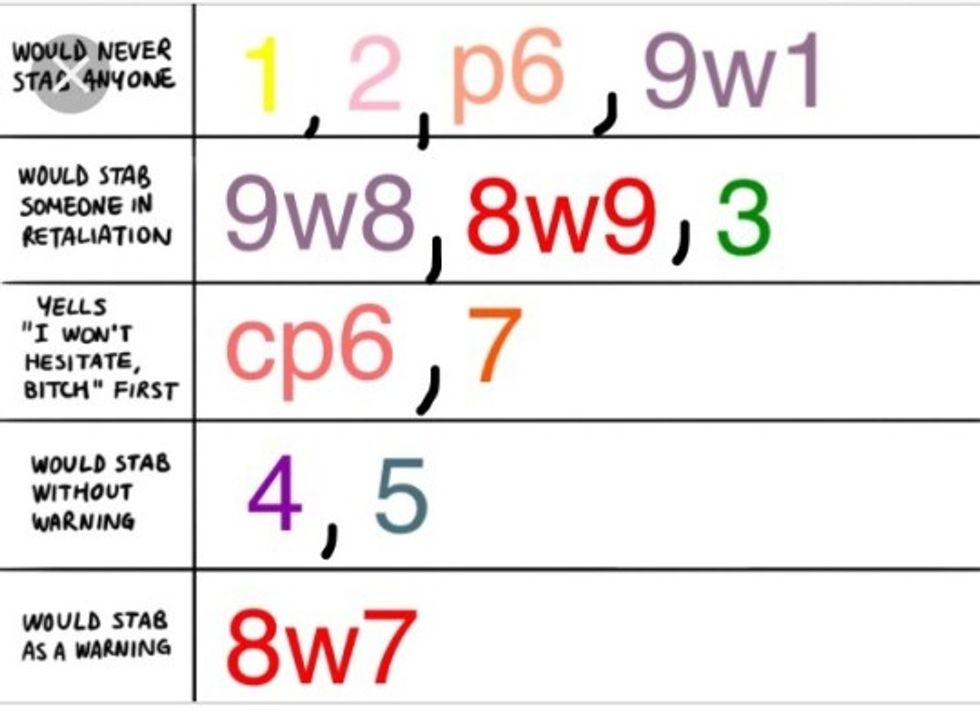
Each number has another number it moves toward in a state of disintegration, or when unhealthy or stressed; and a number it moves toward in a state of integration, or when healthy or growing. So when a 2 is stressed, they become more like an aggressive and dominating 8; whereas when a 2 is growing, they become more emotionally aware and caring of themselves like a 4.
As a number becomes the healthiest version of itself, it also begins taking on the healthy characteristics of its growth number and (eventually) the positive characteristics of its stress number as well. When a 2 grows, they take on the 4's ability to enforce personal boundaries and take care of their own selves, becoming emotionally self-aware. Instead of becoming like an unhealthy, combative 8 when stressed, a 2 can learn from the 8's ability to make a clear and open stand for what they want, taking responsibility for meeting their own needs.
So each number has two immediate paths for growth: looking at the healthy characteristics of their stress and growth numbers. These are helpful because a 2's struggles won't be the same as a 7's or a 9's. A 2's growth state is to become more aware of and strong in their own boundaries, whereas the opposite is true for a 4, who already has this level of self-awareness but needs to learn how to be more warm and accepting toward others and toward their own self. Being able to look at one's unique struggles is the most immediate and helpful path to growth.
Each number can also look to their wing's numbers as well. A wing's numbers of growth and stress will influence your primary number.
So a 2w1 can look at the 1's connection points and see that a 1 moves toward a 4 when stressed and a 7 when growing. 4 is the state of growth for a 2 and stress for a 1, which means a 2w1 can be aware that they are more likely to identify with the shadow side of 4 as well as the attributes. And a 2w1 can look at the 7 and find more value in taking on the bright, energetic nature of a 7; whereas a 2w3 would learn more from understanding the 6's security needs, cooperation, and commitment.
Growth states are often where mistyping—or a person thinking they're a certain Enneagram number when they're really a different one—can be common, especially among people who are coming across the Enneagram after years of self-awareness and growth. I have a friend who thought he was a 2, but upon reflection it became clear he was an 8. An 8's growth number is 2, so over the years, he grew out of his relationally-combative, aggressive 8 nature and turned his energy toward altruistically making a difference in his career to the point that he now seems like a generous, genuinely helpful 2.
Many of us are coming to the Enneagram as adults, after already doing a lot of this heavy soul-searching without the guide of the Enneagram to help us. If you're confused about what number you are, and none of the descriptions seem to be helpful, think back to what you were like as a child/adolescent/ young adult. Maybe you don't have a temper to speak of now—but did you use to yell and become vehemently angry and have to work really hard to get that under control? Thinking about your earlier primal struggles can help you pinpoint the shadow side of your likely number—and then reading on the Levels of Development (more below) to determine where you are now can give further insight.
3. Instinctual variants.
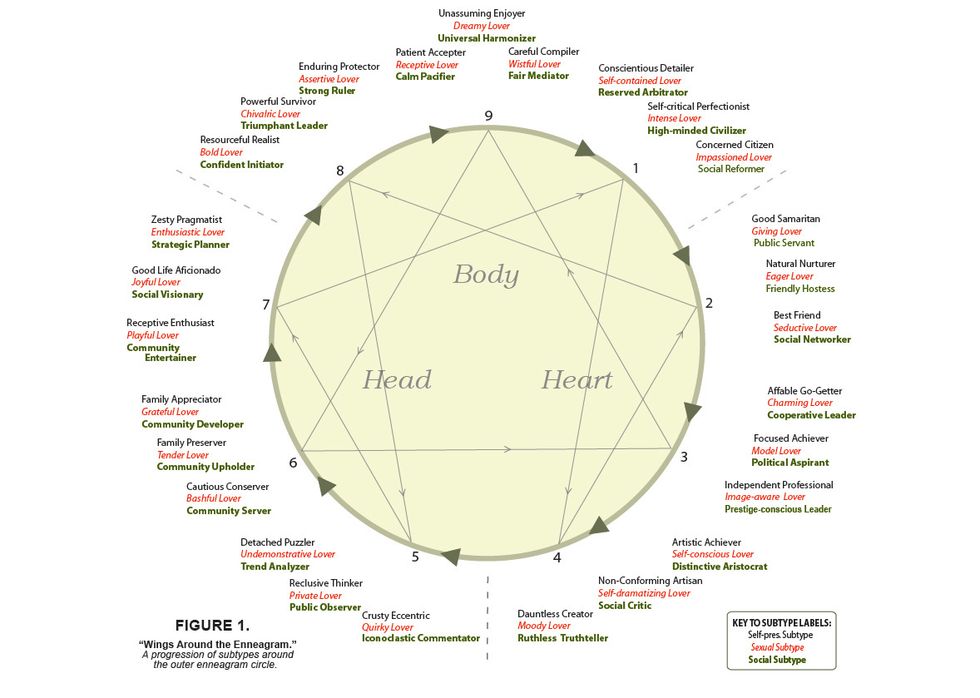
Instinctual variants are the hierarchy of our instincts that prioritize the way we prefer to respond to the world: Social, Sexual, and Self Preservation. Everyone has these three instincts, but we each prioritize different ones.
Social (So) loves people, prefers groups, and cultivates social networks and bonds. A Social person needs to form bonds in their community and is driven to fit in; they care about responsibility and rules.
Sos are highly aware of power structures and want to build their worth as it relates to others. Unhealthy Sos fear or resent society, willfully refuses to follow through with social niceties to get along with others, and are antisocial. You may be a So if you neglect your need for intimate connection or physical/emotional safety in order to focus on building your accomplishments and networks with others. This may look like neglecting sleep or food, not prioritizing your body or your need for mental stimulation, and feeling disconnected from your loved ones even when you have a support system.
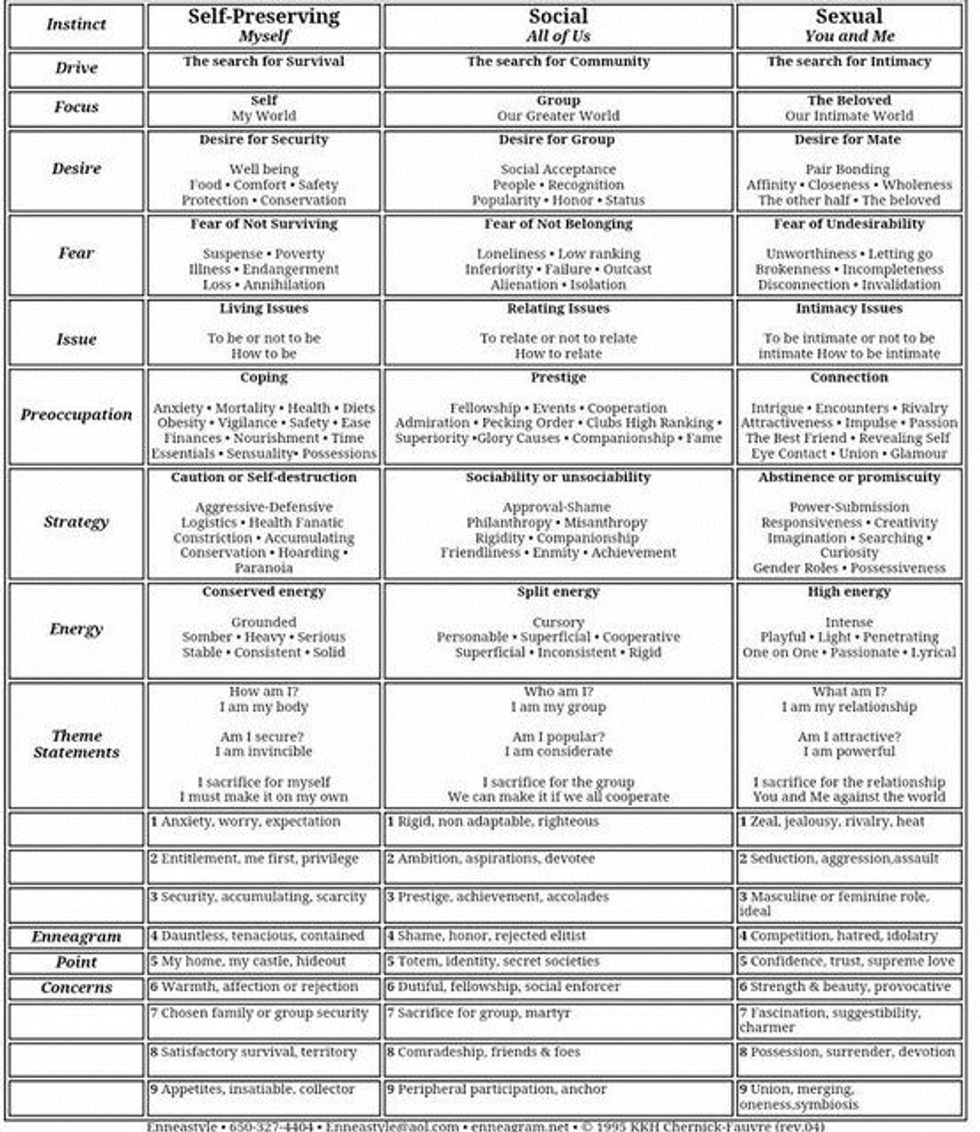
Sexual (Sx) is not about sex (the most common misassumption), but is driven to create intimacy through one-on-one interactions. They are the most passionate, intense, and temperamental—they look outside of themselves for the one person that will complete them and feed off the energy of others. Unhealthy Sxs struggle to focus, passionately avoid intense connections, and have a dysfunctional relationship with intimacy.
You may be a Sx if you overlook more overarching community building or personal-care needs for intense experiences and high-energy connections. If someone's ever told you your love/life choices are "masochistic", you could very well be a Sx. This emphasis on passion and romance leaves your need for a communal connection on the wayside, sometimes causing a rift between loved ones who are neglected in your search for the next new shiny.
Self Preservation (Sp) are focused on safety: physical as well as emotional. They are driven to pursue financial and health stability, comfort, and safety, and care about aesthetics in their environment (a lovely house, well-presented food).
An unhealthy Sp stresses over their safety (what if they can't afford food? What if they can't afford food they like? What if they can't afford food they like that fits into their diet?) and struggles with excesses of hoarding or purging, oversleeping or undersleeping, overeating or undereating, etc. You may be a Sp if you pursue your own safety and comfort at the expense of cultivating social or intimate relationships and may not even realize you are alienating yourself from loved ones.
We all have all three Instincts in different orders: Some say the first is what we want, the second is what we're comfortable with, and the third is our blindspot (detailed below).
Others say the dominant instinct is a weakness: it's overdeveloped, unbalanced, and is driven by fixation, so it doesn't best serve the individual in a balanced way; whereas the secondary instinct is far more balanced, and the third is the blindspot.
Still another idea is that the first instinct is the shield (we're most serious and insecure about this one and therefore overcompensate; get antsy about not doing things associated with this instinct; and use this instinct not only to defend ourselves from others, but defend this instinct to others.), the second is the weapon (we use this balanced instinct to connect with people: it's our most healthy instinct. We also use it to attack people if necessary as we use it creatively and solve problems with this instinct, so if someone is hurting us, this is our go-to. This instinct drives how we have fun with others and we need a certain amount of it to feel fulfilled through the day, but we tend to be far more conscious about this instinct, which means we can often think this one is our primary.), and the last is our blindspot (we are unaware of or ignore this instinct. This instinct is also our aspiration: we aren't good at getting these needs met, but it would greatly fulfill us if we did. We're out of touch with the instinct and can respond one of three ways when it's pointed out: accepting it and using it as an excuse; rejecting how we fail by saying others are wrong; or being anti this instinct and actively trying to tear it down in other people).
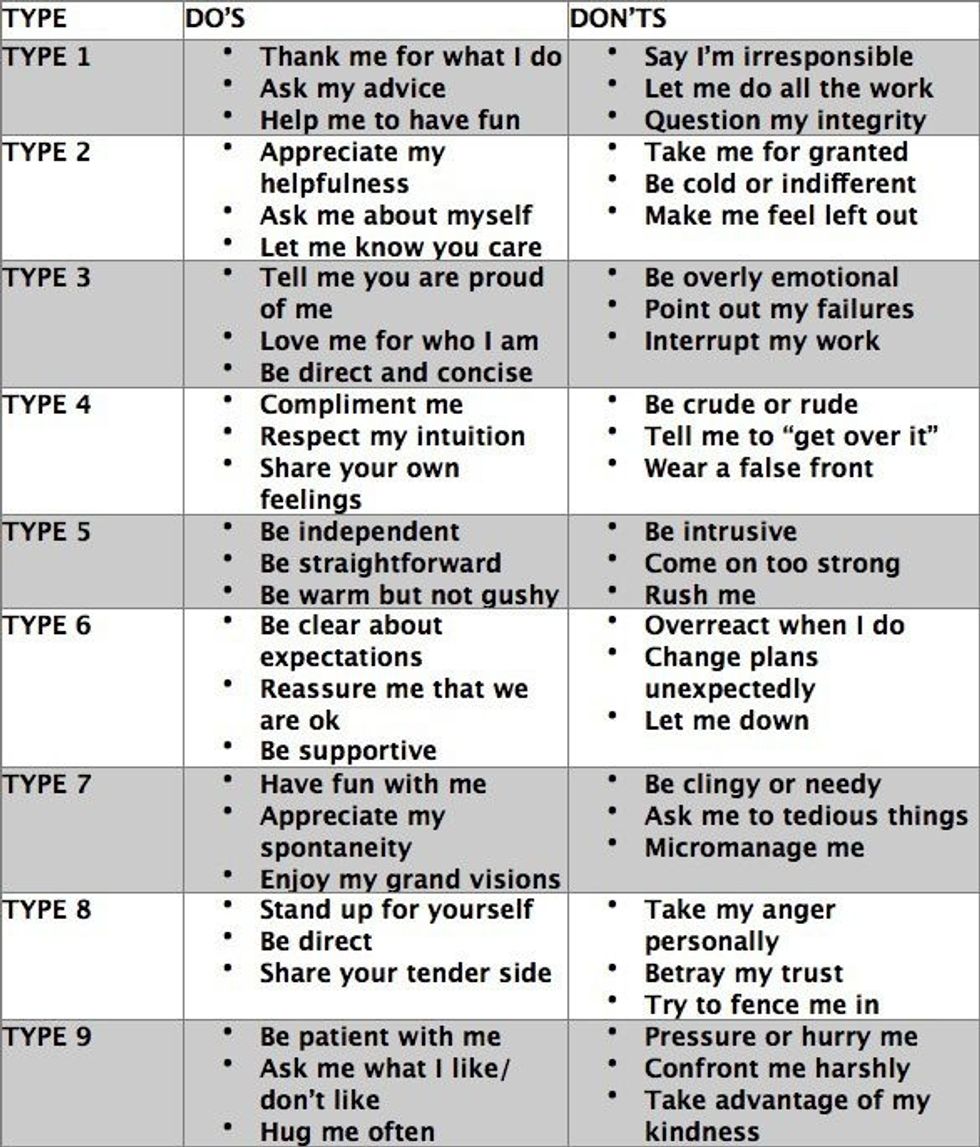
So a 2 whose primary instinct is Self Preservation is the Nurturer and struggles with privilege: they put in a vast amount of effort into supporting others, which makes them feel entitled and angry when their own needs are not met in return. A Sp 2 is likely to play the martyr and can create engaging relationships with anyone.
A 2 whose primary instinct is Social is the Ambassador and struggles with ambition: they are highly empathic and others-aware, positing themselves as indispensable to various communities and people. They thrive off of social approval and don't feel the need to be the visible leader—as long as they are given praise for being the vital behind-the-scenes staff.
And a 2 whose primary instinct is Sexual is the Lover and struggles with seduction or aggression: this person uses the 2's incredible social-ingraining ability to make intense connections in their relationships. They can be more aggressive in these connections, insisting on being recognized for their attention and warmth. The way they communicate and make the other person feel can come across as seductive, even though it may be entirely detached from sexuality.
To figure out your instinctual stacking, check out the descriptions of how your number would respond if your primary stacking were So, Sx, or Sp.
4. Levels of development.
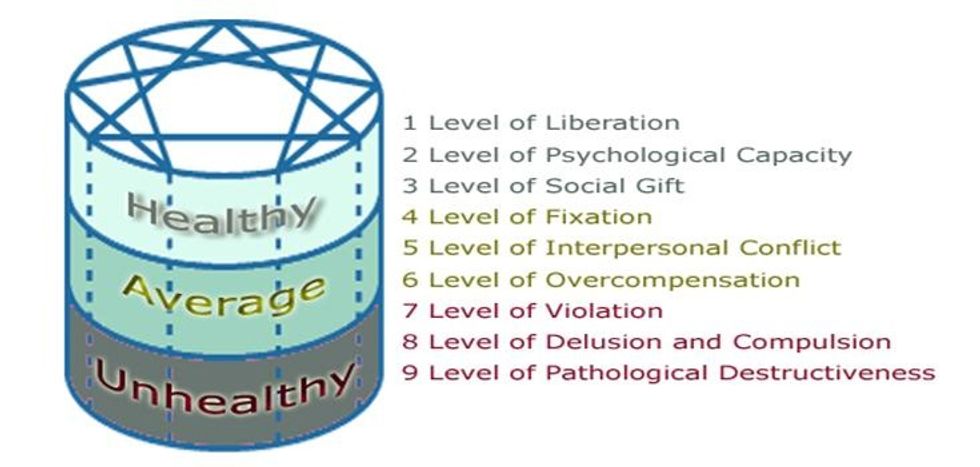
We see, then, how a 2 with a 1 wing is far different than a 2 with a 3 wing, and how each number's states of growth and stress influence them further. How a person prioritizes their instinct brings another layer to each person's unique development: a 2 whose primary instinct is Sexual is far different than a 2 whose primary instinct is Self Preservation.
But each number also has 9 levels of development—divided into Healthy Levels (1-3), Average Levels (4-6), and Unhealthy Levels (7-9). Each level has its own coping mechanisms, defenses, motivations, and vulnerabilities that show why people of the same personality type can vary so greatly, how individuals can have so many contrary traits within their own selves and how they can grow to become better, or spiral into unhealthy patterns. People's responses can change even day to day, and the Levels help show where a person is at on any given day and over time.

For example, let's take a 2 at unhealthy Level 7 (the Level of Violation), Average Level 4 (the Level of Imbalance/ Social Role), and Healthy Level 1 (the Level of Liberation).
At unhealthy Level 7, the 2 is manipulative, bends over backwards to get sympathy, and guilt-trips others. They are manipulative, self-deceptive, and blind to how selfishly they treat others. At Level 4, the 2 is warm, demonstrative, and uses friendliness to develop a close connection with others. Is seductively (sometimes unknowingly so) attentive, heaping compliments on others in an effort to cultivate love, the thing they value most. At their best, Level 1, the 2 is capable of unconditional love, to both their own self and to others. They are sincerely honored to be impactful in others' lives and are deeply caring, altruistic, and unselfish.
At any given point a person may be fluctuating between several levels in several different personal areas of growth or struggle.
To determine your Level of Development, learn about the various struggles and strengths associated with each Level and see where you fit it. Note: this takes a high amount of self-awareness, or the willingness to be self-aware!
5. Three centers of intelligence.

The Enneagram sorts the nine numbers into three Centers of Intelligence: The Instinctive (Body), Feeling (Heart), and Thinking (Head). These are formed as a response by the person to anger/rage, sorrow/shame (of not knowing or accepting who they really are), and fear/anxiety respectively.
8s, 9s, and 1s are Head (valuing rationality, strategies, and logical intellect); 2s, 3s, and 4s are Heart (focused on empathy, other-focused, romantic, devoted); and 5s, 6s, and 7s are Body (a high awareness of senses, strong intuition, focused on personal security and social acceptance).
You may be getting this by now: all of us have all of these, but one of these will affect us most strongly based on our number, and our reaction to our dominant emotion is influenced by these Centers.
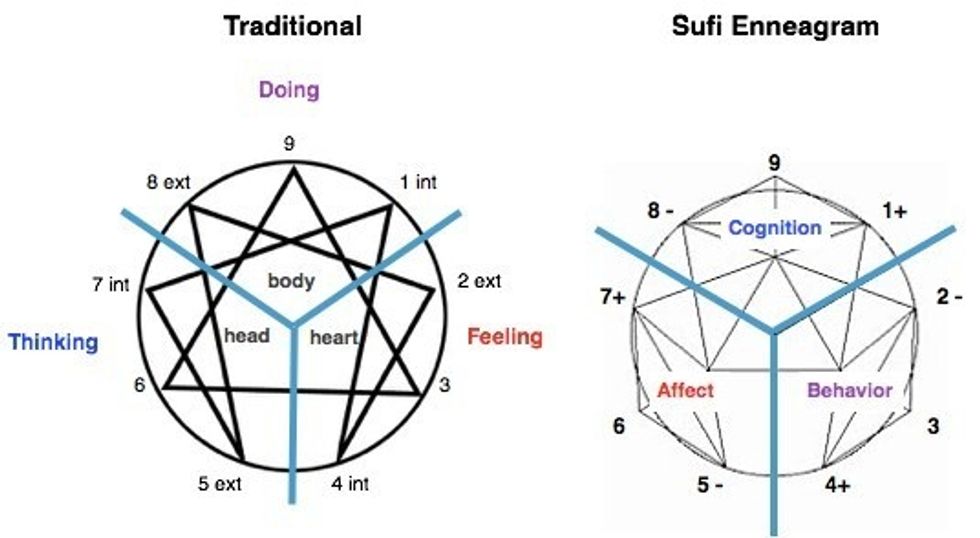
The Body Centers: 8s respond to anger/rage by assertively or aggressively expressing it and taking control; 9s suppress their anger to avoid conflict and resist controlling people; and 1s have anger that manifests as resentment and they assert strong control over their own selves. The Bodies struggle with Self-Forgetting and use physical movement as a way to understand or to hide from the world; they are heavily focused on their intuition and instincts. Their growth comes from realizing and accepting they have both mental and emotional needs, and listening to their hearts and heads.
The Heart Centers respond to their shame/sorrow by creating a substitute image: 2s try to become likable and thoughtful; 3s try to project confidence and success; and 4s claim an identity of being unique and different. Hearts are driven by the need for affirmation from the outside to figure out their own value or identity; this need for affirmation is inspired by their grief over this loss of identity. Their growth comes from the wisdom they find outside of people: by what they already know in their own body or in their own mind.
The Head Centers result from a response to fear and a need to control to feel safe: 5s fear intrusion and end up withdrawing; 6s try to plan and anticipate negative circumstances; 7s avoid all uncomfortable feelings by continually chasing after fun novel experiences. Heads use their minds to create safety, or to create options to keep themselves safe—they love to plan and problem-solve. Heads end up looking very rational and reasonable; their growth state is getting out of their heads and accessing their bodies and hearts.
Knowing your number and your dominant Center of Intelligence illuminates the way in which you utilize or ignore each Center.
For example, a 9 can gather so much information that they become confused about which piece of information is most important (Head). 9s can be too empathic with friends and family but dismissive and unkind to people they don't care for (Heart). 9s can inordinately dig their heels in when they think someone is trying to control them, but can compromise too much on personal standards or beliefs (Body).
Your dominant number is the first Center of Intelligence you use. To figure out which one is second and third, read up on the way each Center of Intelligence responds to stressful situations and see which makes the most sense to you.
Do you listen to your gut and follow your heart? Do you thrive on affirmation and break under criticism? Are you obsessed with making lists and knowing your schedule? When plans fall apart, do you withdraw or do you get antsy and have to do something else? Knowing the coping mechanisms you use and the order in which you turn to them will help you determine in what order you use your Body, Head, and Heart.
6. Tritypes.
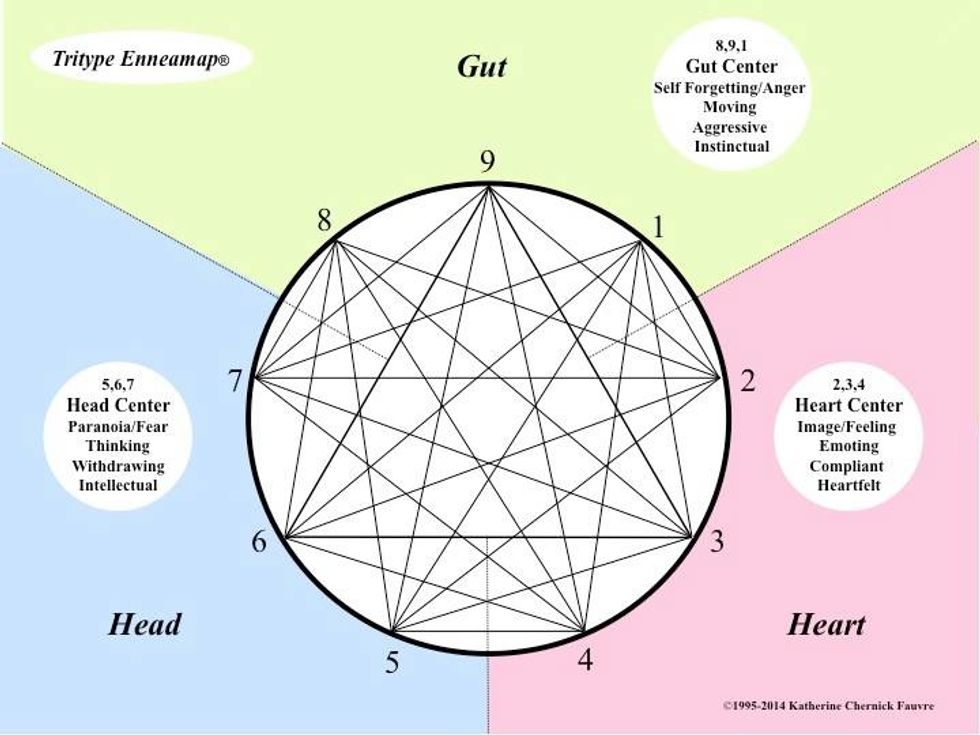
You have a connection with an Enneagram number in each Center of Intelligence that intersect to create unique ways you cope and interact with the world. Your dominant type is your own number, but then you have two other numbers (not necessarily your numbers of stress/ growth) to which you turn when your primary number's strategies and coping mechanisms don't work. These two other numbers combined with your number are called your tritype. If you're a 2, but your growth/stress states and wing isn't working for you in a given situation, you will then use the dominant type in your next center (for a 2, that would be Head or Body) to try to cope.
So a 2 whose tritype is a 268 is called the Rescuer. They want to feel safe and secure, to help and protect others, and to defend the vulnerable. They can struggle with pride because they know that they know how to help others. This 2 needs to be in charge, likes to break the rules, is possessive and domineering, and can be explosive, controlling, or powerful.
A 2 whose tritype is a 269 is called the Good Samaritan. This 2 is engaging, gets along well, and helps mediate others' conflict. They want to identify problems and what those problems need and create peaceful solutions. They are so focused on making peace and tending to others' needs that they won't prioritize standing up for their own needs. This 2 is easygoing, passive, and avoids confrontation—they're insecure, anxious, and often evasive.
No matter what Center of Intelligence our dominant number is, we each use all three Centers of Intelligence by using one of the tendencies of a particular number in that Center of Intelligence. You can see how a 2 who turns to the 9 tendencies when they are using the Body Center of Intelligence is far different than a 2 who prefers the 8 tendencies of the Body.
To determine what your tritype is, you can read descriptions of numbers here or you can dig deeper into the numbers in each Center and see which reactions and struggles stand out more to you.
7. Culture
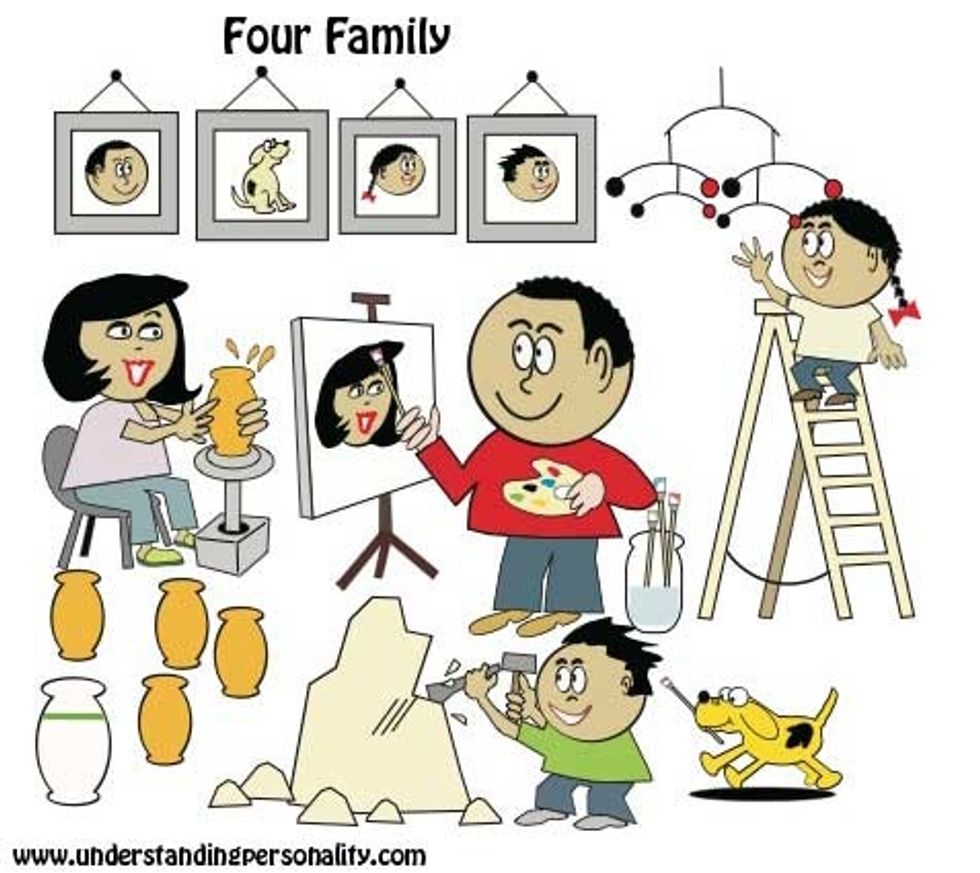
The way in which you were raised—your family, society, and impactful influences—is the last way in which you can be affected by different Enneagram numbers. Each culture has its own type of number that it most aligns with. Women in general, but Christian women in particular, are raised as 2s. Religious people are often raised as 1s. Men (in America) are often raised as 8s or 3s.
If you watch Green Book, Tony's Italian family clearly interact as 8s. The United States encourages the successful orientation of the 3 and represses a lot of the other numbers' manifestations.
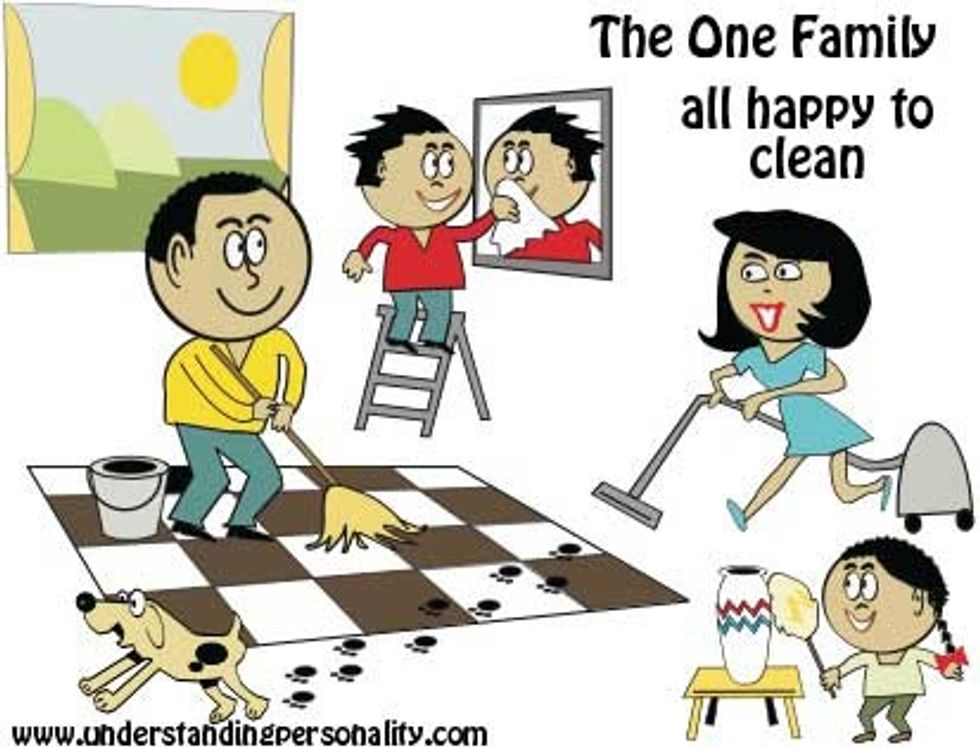
If your parents are artistic, aesthetically oriented individuals who chase their dreams and engage in deep conversations about meaningfulness for hours, you were raised as a 4. If your parents are ambitious, assertive, make great strides in a career dedicated to helping others, and rarely talk about their feelings, you were raised as an 8.
The culture in which we're raised greatly influences our native number and can create a strong amount of cognitive dissonance as nature and nurture collide. I'm a 2—driven to please people, serve them, and make sure they need me so I can make sure they don't abandon me (a 2's deepest fear: being abandoned and unloved)—but I was raised in a religious 1 culture, where what mattered wasn't just getting along with people, but what was right and what was wrong. It didn't matter how many friends you lost along the way, so long as you were standing up for what God said was the thing to do. This dissonance between my heart (making people happy) and my head (what was right) caused great internal conflict.
My literary mother also raised us kids with a heavy 4 dose: no matter our natural numbers (we're 2s, 5s, 6s, 8s, and 9s), we are all aesthetically oriented, sensitive, thrive on deeper subjects, and all have a dash of existential identity despair.
Your culture's number conflicting (or complementing) with your number will cause more unique dissonances, contradictions, and amplifications within your own self.
8. Even just one of these variations provides a new path for growth.
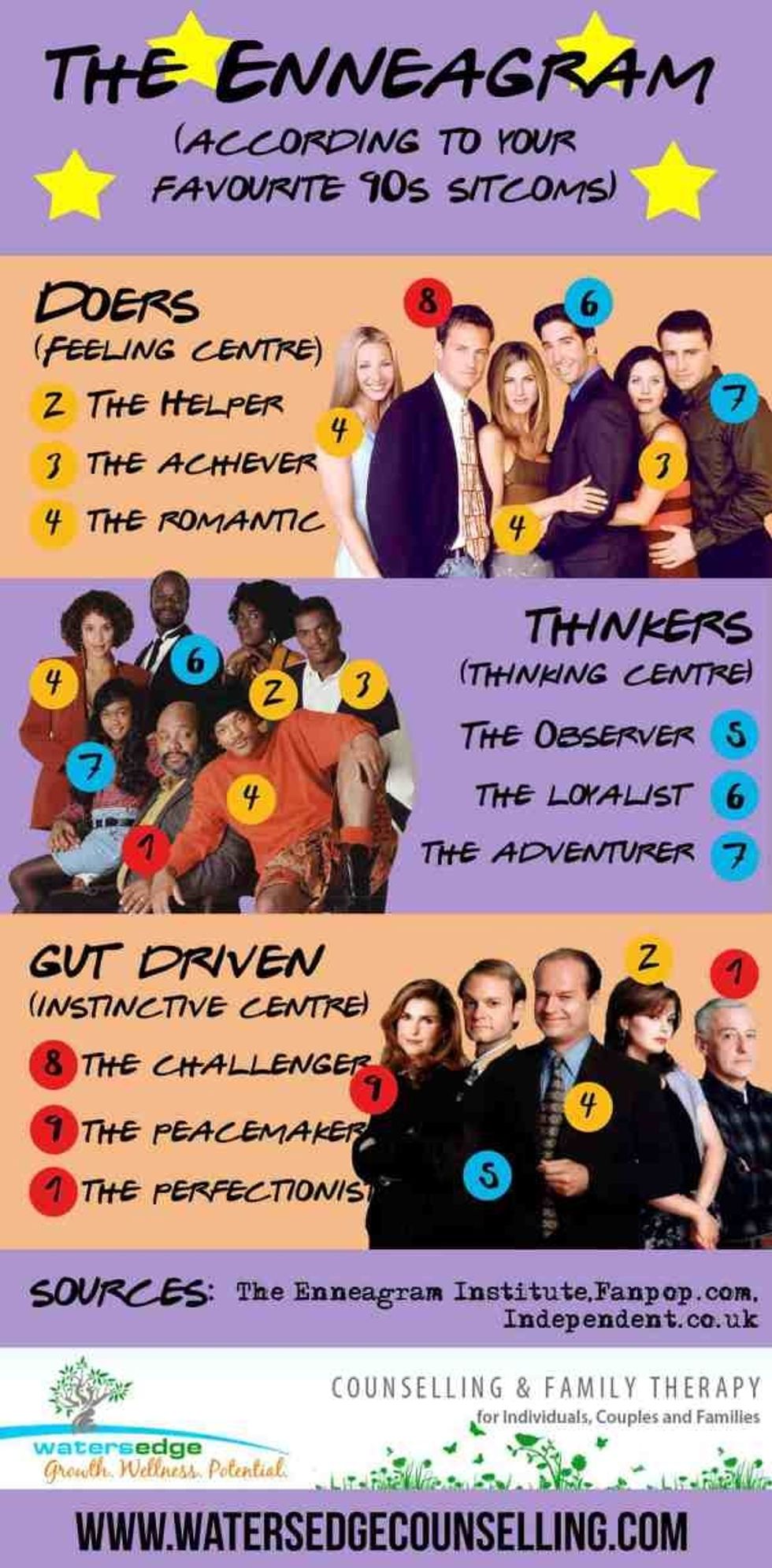
Whew—you made it through all the complexities of the Enneagram! There are so many variations for each number. Picking even just one of these variations to learn about will give you a blueprint for ways in which you can grow. If I focus on the Centers of Intelligence, knowing I use my Body last shows me that I would grow a lot by challenging myself to heed my intuition, pay more attention to my body's experiences, and explore ways to grow my personal security. If I pick wings, knowing that my 2 wing is a 1 helps me learn from the 1's growth and stress states as well as my own.
There is no need to learn about all of these all at once. But they're there for you when you need them, offering advice on personalized ways for you to grow.



















